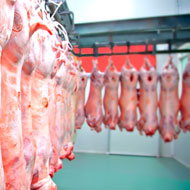Diseased meat fears follow rule change

FSA says evidence shows handling and cutting meat can spread harmful bacteria.
Diseased meat may enter the human food chain as a result of new EU regulations, hygiene inspectors have warned.
New rules came into force on June 1, stating abattoir inspectors will no longer be able to cut open pig carcasses to check for disease, but will rely on visual checks alone.
Britain's Food Standards Agency (FSA) says the move will reduce the risk of bacteria being spread around the meat.
The new rules were drawn up by the European Food Safety Authority based on guidance from the FSA.
According to the FSA, scientific evidence shows handling and cutting the carcass and offal can spread harmful bacteria.
The agency argues that today, the main threats are microbiological - including campylobacter, salmonella and E.coli - and cannot be sufficiently addressed using traditional inspection methods.
However, the new regulations risk abscesses, TB and other disease entering the human food chain, according to the European Working Community for Food Inspection and Consumer Protection (EWFC).
According to the BBC, shadow food and farming minister Huw Irranca-Davies has called for an urgent meeting with the FSA.
He said: "We want to see absolute categoric assurance that this is not jeopardising consumer protection and we're not reassured yet because despite the work that the FSA has been doing over a few years now to look at this issue, what they have presented to us is not a compelling case for a change in the way that this works."



 HMRC has invited feedback to its communications regarding the employment status of locum vets and vet nurses.
HMRC has invited feedback to its communications regarding the employment status of locum vets and vet nurses.